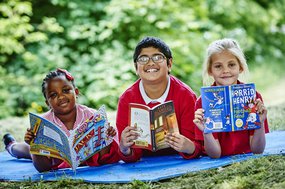
Key findings
Book ownership and access to books at home can influence a variety of life outcomes, from educational attainment to income in adulthood. In 2019, we found that children and young people who said that they have a book of their own at home were not only more engaged with reading but also six times more likely to read above the level expected for their age (22% vs. 3.6%) compared with their peers who told us that they didn't have their own book.
- In 2022, 93.5% children and young people aged 8 to 18 said that they have a book of their own at home, meaning 1 in 15 (6.5%) do not.
- Nearly 1 in 10 (9.7%) children and young people who received free school meals (FSMs) said that they did not have a book of their own at home compared with 1 in 17 (5.8% ) of those who do not receive FSMs. This is a very slight increase compared with 2021, when 1 in 11 (9.2%) children and young people who received FSMs said that they didn’t have a book of their own at home.
Book ownership and reading enjoyment, frequency and attitudes
We also looked at the number of books that children had at home and how this related to reading enjoyment, frequency and attitudes.
- Of those who said that they have books at home, over 1 in 5 (22.3%) had fewer than 10 books at home.
- The number is higher for those who receive FSMs, with 1 in 3 (32.1%) children and young people who received FSMs saying that they had fewer than 10 books at home compared with 1 in 5 (20.0%) of their peers who do not receive FSMs.
- Just 1 in 3 (32.6%) children and young people with fewer than 10 books at home said that they enjoy reading compared with 3 in 5 (61.4%) of those with 50 or more books at home.
- 1 in 6 (15.9%) children and young people with fewer than 10 books at home said they read daily compared with 1 in 2 (49.0%) children and young people with 100 or more books.
- Just 2 in 5 (39.7%) of those with fewer than 10 books at home said that they read to relax compared with 7 in 10 (71.3%) of those with more than 100 books at home (a difference of more than 31 percentage points).
These findings suggest that while having any books of your own at home is likely to have an impact on reading engagement, having more than 10 books is associated with a wide range of positive reading attitudes and behaviours. Notably, these impacts increased steadily in proportion to the number of books children reported having at home.